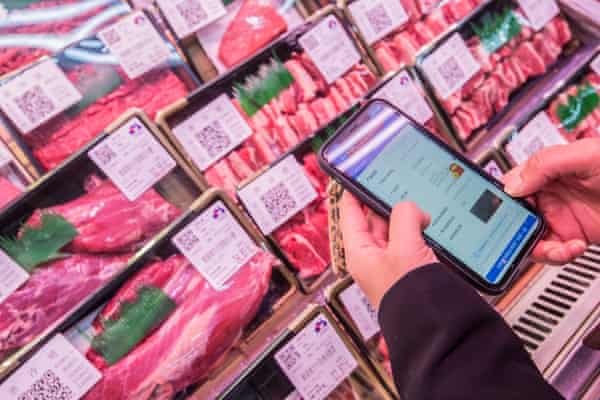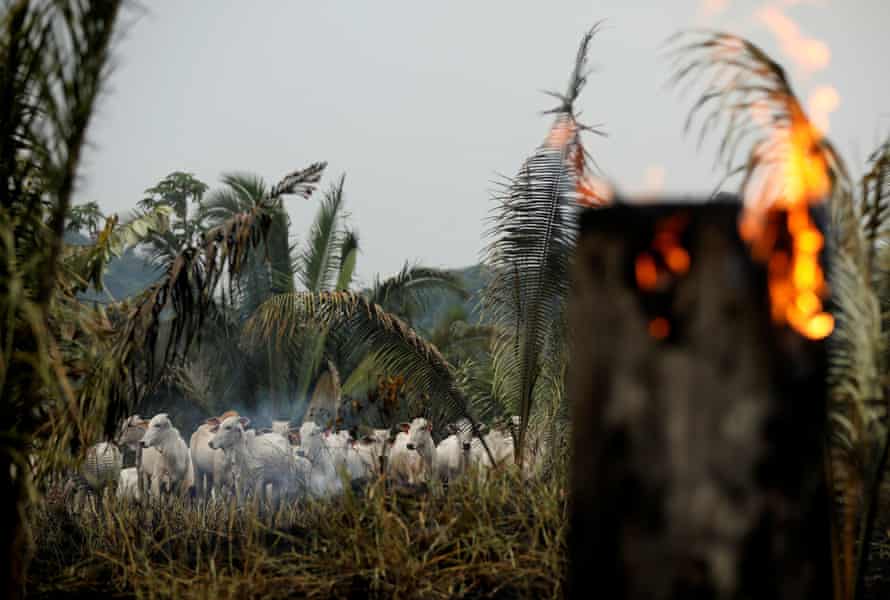Over dinner in a busy barbecue restaurant in Shenzhen, Lei Yong and Zhao Xu, two businessmen in their mid-40s, reflect on how meat consumption in China has dramatically changed in their lifetimes, particularly over the past 10 to 15 years.
“Maybe 20 years ago, people in villages and smaller cities didn’t eat much meat, but those in big cities did,” says Zhao, referring to the bustling megacity in which he and Lei are raising their families. “Now people in bigger cities are more health conscious and are eating more vegetables, but those in smaller cities have more money. Now they’re really eating a lot more meat. They think that being rich means eating more meat.”
Ravenous demand from China has helped Brazilian beef sales rocket to record levels – but the boom comes at a high environmental cost.
Brazil’s economy has been hit hard by the coronavirus pandemic, and more than two million people have lost their jobs. But agriculture continues to flourish, and the country is the world’s biggest beef exporter.
Brazil supplied 43% of China’s meat imports in 2020, the consultancy Safras & Mercado calculated using government data, with beef exports to the country up a staggering 76% last year compared with 2019.
“There has been this boom,” says Thiago de Carvalho, a professor of agribusiness at the University of Sao Paulo, highlighting the quality of Brazilian beef and its low price after the Brazilian currency, the real, tumbled last year. “Brazilian meat is [among] the cheapest in the world.”
Sales are predicted to climb even higher this year, as China’s pork industry struggles to recover from the deadly pig disease African swine fever.
“China’s need to buy meat last year was impressive,” says Fernando Iglesias, an analyst at Safras & Mercado, which translates as Harvests and Market. “Brazil is more than able to supply what the Chinese need.”
Although the Chinese eat less meat per head of population than Americans, consumption has risen in recent decades as the economy grows. Traditionally, China’s favourite meat is pork, but in 2018 and 2019 more than half of the country’s 440m pigs were killed by African swine fever or slaughtered to slow its spread. Beef imports rose as China sought to replace the protein.
Consumer surveys also show more Chinese turning to beef. A poll of affluent Chinese consumers by the marketing company Meat & Livestock Australia found that a third had eaten more beef during the past year.

Almost 70% of China’s Brazilian meat imports came from the Cerrado, the vast tropical savanna region, and the Amazon in 2017, according to Trase (Transparency for Sustainable Economies), a European network that monitors supply chains. About half of the Cerrado and about 20% of the Brazilian Amazon have been cleared – with a devastating impact on global heating as both are important carbon sinks.
“The Amazon provided about a fifth of China’s imports but is actually half of the deforestation risk,” says Erasmus zu Ermgassen, a researcher at Louvain Catholic University in Belgium and one of the authors of a study on the impact of beef exports.
“Exports are expanding into the Amazon,” says Zu Ermgassen. “When you increase demand on the Brazilian agriculture system you are pushing agriculture farther into the forest.”
Since 2019, China has reportedly licensed 22 Brazilian slaughterhouses for exports – 14 of them in the Amazon, while four are in the sprawling Amazon state of Para, which has Brazil’s fifth-largest cattle herd.
This had a big impact on the price of meat, says Mauricio Fraga Filho, a cattle rancher and president of Para’s ranchers’ association.
Under Brazil’s far-right populist president, Jair Bolsonaro, who took office in January 2019, Amazon deforestation has surged to a 12-year high. Investors and large Brazilian companies have pressured the Brazilian government to act, and ranchers such as Fraga Filho are worried about potential boycotts.

“This is a big concern,” says Fraga Filho. “The market shouldn’t bar products from the Amazon. This will be chaos.”
He says more effort should be put into helping farmers resolve legal problems, such as land embargoed due to environmental offences, enabling them to supply meat companies legally. This would stop them selling to a black market that “exists and has always existed”, says Fraga Filho. “Today there is no need to deforest any more.”
Brazil’s big three beef exporters – JBS, Marfrig and Minerva – handled 72% of Brazil’s beef exports from 2015-17, according to Trase. All three have spent heavily developing systems to monitor their “direct suppliers” – farmers such as Fraga Filho who sell on to slaughterhouses – for environmental offences. But they have been unable to monitor their “indirect suppliers” – farms breeding or raising cattle that supply the “direct suppliers”.
Last year, JBS and Marfrig promised complete monitoring of their supply chain by 2025 and Minerva is testing a system to control its suppliers.
While China has yet to show concern over the connection between Brazilian beef imports and Amazon deforestation, there are at least signs that its government wants to cut meat consumption, which would improve public health and reduce carbon emissions. Last September, President Xi Jinping surprised many when he said China would aim to become carbon neutral by 2060.
But while the market for plant-based alternatives is growing, weaning people off meat – and the sense of wealth that it brings – may prove harder than he expects.
-
Dom Phillips is a 2021 Alicia Patterson Foundation fellow
Sign up for the Animals farmed monthly update to get a roundup of the best farming and food stories across the world and keep up with our investigations. You can send us your stories and thoughts at animalsfarmed@theguardian.com